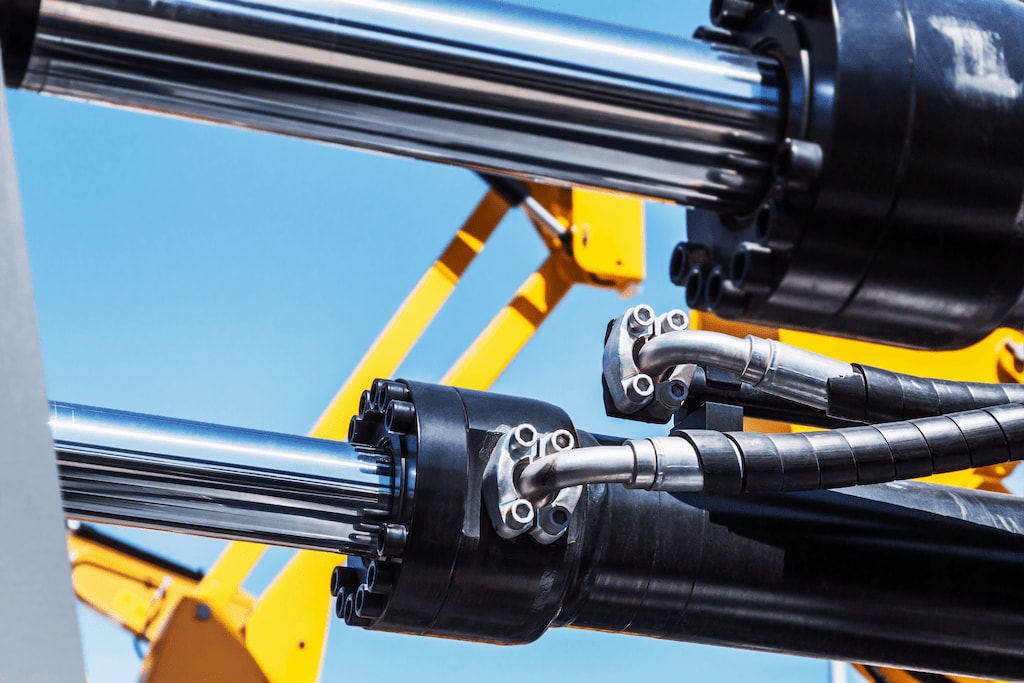A Guide to Hydraulic Fluids
Your hydraulic fluid is the lifeblood of your entire system. When we think of hydraulic machinery, we tend to first consider the pistons and parts, but the fluid you choose is just as important as the components you incorporate.
/ 2
Understanding hydraulic fluids and selecting the right one for your application is crucial for system performance, efficiency, and longevity. The wrong fluid choice can lead to poor pressure, inefficient running costs, and even system breakdown, so getting it right the first time is vital.
What is Hydraulic Fluid?
Hydraulic fluid serves multiple functions within a hydraulic system. Beyond its primary role of transmitting power, it acts as a lubricant for moving parts. It also transfers heat away from various components, and it carries away contaminants and debris through the filtration system.
There are many different types of fluids available. The choice you make should depend on your system’s requirements and the demands of the machinery.
Types of Hydraulic Fluids
The most common types of hydraulic fluids can be categorised into three main groups, each with distinct characteristics and applications.
Petroleum or Mineral-Based Hydraulic Fluids
These are the most widely used hydraulic fluids in industrial applications. These oils provide excellent lubrication properties and good oxidation resistance at a reasonable cost.
They’re compatible with most common seal materials and they offer reliable performance across a wide range of operating conditions. However, their main drawback is their flammability, which can make them unsuitable for high-temperature applications or environments where fire risk is a big concern.
Water-Based Hydraulic Fluids
Water-based fluids were developed primarily to address the flammability concerns of mineral oils. These fluids come in several varieties, including water-glycol mixtures and oil-in-water emulsions.
While they offer superior fire resistance, they typically provide less lubrication than mineral oils and they may require special considerations for seal compatibility and corrosion protection. They’re commonly used in steel mills, die-casting operations, and other applications where fire resistance is paramount.
Synthetic Hydraulic Fluids
Synthetic fluids are at the forefront of hydraulic fluid technology. These engineered liquids offer superior performance in extreme conditions, whether it’s high temperatures, extreme pressures, or challenging environments.
While they often come with a higher price tag, their enhanced performance and longer service life can justify the investment for demanding applications.
Selecting the Right Hydraulic Fluid
When choosing a hydraulic fluid, several key properties must be carefully considered to ensure optimal system performance.
Viscosity
Viscosity is perhaps the most critical property of a hydraulic fluid. The liquid used must be viscous enough to maintain a lubricating film between moving parts. However, it should be low enough to flow freely through the system with minimal energy loss.
The fluid needs to maintain adequate viscosity across the entire operating temperature range of your system. Too low a viscosity leads to excessive wear and potentially even internal leakage. Meanwhile, too high a viscosity can lead to sluggish operation and energy waste.
The viscosity index (VI) indicates how much the fluid’s viscosity changes with temperature. A higher VI means the fluid maintains more consistent viscosity across a wider temperature range. This is particularly important for equipment operating in areas where temperatures fluctuate – such as outdoor sites. Modern hydraulic fluids often include VI improvers to enhance this property.
Oxidation
A hydraulic fluid’s oxidation stability determines how well it resists breaking down when exposed to heat and air. This property is particularly important in high-temperature applications or in systems with small reservoirs where the fluid experiences frequent temperature changes. Poor oxidation stability leads to the formation of sludge and can increase viscosity.
Wear and tear
Wear resistance is often measured through standardised tests like the FZG gear test or vane pump tests. These tests reveal how well the hydraulic fluid protects system components when put under increased load.
Modern hydraulic fluids typically contain anti-wear additives that form protective films on metal surfaces, reducing friction and wear under boundary lubrication conditions. These types of fluid are good options for systems that suffer from extensive wear.
Combustibility Considerations
Traditional mineral-based hydraulic fluids are flammable and can ignite under certain conditions, particularly when exposed to high temperatures or pressures that create a fine mist or spray. This risk has led to the development of fire-resistant hydraulic fluids, especially developed for use in applications where fire hazards are a concern.
Fire-resistant hydraulic fluids are categorised based on their composition and their level of fire resistance.
These include:
- High water content fluids (HFA, HFB)
- Water-glycol fluids (HFC)
- Water-free synthetic fluids (HFD)
The choice between standard and fire-resistant fluids should be based on a careful risk assessment of your application, considering factors such as proximity to ignition sources, operating temperatures, and the potential consequences of a fire.
Contact the Experts in Hydraulic Fluids
Selecting the right hydraulic fluid is a decision that impacts every aspect of your hydraulic system’s performance, as well as its longevity, maintenance requirements, and general safety.
When choosing a hydraulic fluid, consider the full operating environment of your system – from temperature ranges and pressure requirements to safety considerations and maintenance schedules.
Remember that, while premium fluids may cost more initially, they often prove more economical in the long run through improved efficiency, extended service life, and better system protection. Regular fluid monitoring and maintenance, regardless of the type of fluid chosen, remains key to ensuring optimal system performance.
If you have any questions about hydraulic fluid – or anything to do with hydraulics, for that matter – reach out to our team. We’re on hand to help you make informed decisions to keep your machinery running smoothly.


